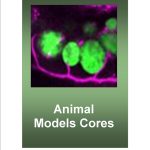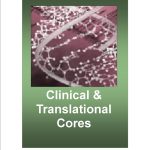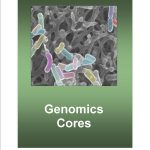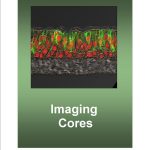UNC Imaging Core Facilities and Resources
Contents
The UNC Imaging Cores and Resources Page introduces a range of methodologies available on Campus ranging from light and electron microscopy to flow cytometry to image analysis techniques. These methods can be used on specimens ranging from molecules to cells to whole animals including humans.
Light Microscopy
Microscopy Services Laboratory
The Microscopy Services Laboratory is a cost recovery center open to all UNC researchers. It has two components: Electron Microscopy and Light Microscopy.
The Microscopy Services Laboratory will consult with you about your project, advise on experimental design and sample preparation, and train you to take images. We have experience with confocal, light-sheet, widefield fluorescence, darkfield, and polarization microscopy. Tiling, multi-day live-cell experiments, FRAP, FRET, spectral imaging and other experimental designs are available
The Hooker Imaging Core Facility
The Hooker Imaging Core is a research facility providing state-of-the-art confocal and wide-field microscopy systems. The high resolution light microscopy systems are now augmented with a Zeiss Airyscan super-resolution sensor. There is also a transmission electron microscope with sample preparation services with training available.
The Hooker Imaging Core is open to all users in the University and Corporate community on a fee basis. For the infrequent, untrained user, the Imaging Facility provides a completely assisted technical support service. Trained users work independently with on-site support. A significant effort is devoted to training investigators who require microscopy techniques to advance their projects
The Neuroscience Microscopy Core Facility
The Neuroscience Microscopy Core provides a full spectrum of advanced systems for cellular and molecular imaging of in vitro and in vivo samples. The Core has multiple state-of-the-art confocal microscopes that are equipped for fast and high-resolution scanning of large areas with tiling and stitching capabilities, imaging live cells and tissues with incubation and CO2, and super-resolution and deconvolution modules for high-resolution imaging. These single photon confocals are complemented by a two-photon microscope set-up for imaging of live animals and large fixed tissues with high resolution optical sectioning. The Core also features widefield fluorescence and color imaging microscopes that can perform integrated analysis and acquisition for high content imaging experiments and can image tissues in live animals in situ with macro to micro imaging resolution. In addition to providing access to high resolution imaging technologies, the Microscopy Core also implements new imaging technologies, and provides training, consultation, data analysis, image processing, and centralized technical expertise to support the imaging needs of scientists in the UNC community. This core facility also features two high-end workstations (512GB of RAM, 12 and 14 Cores each, and multiple powerful GPUs) custom-designed for efficient processing and analysis of very large data sets.
Electron Microscopy
Chapel Hill Analytical and Nanofabrication Laboratory
CHANL (Chapel Hill Analytical and Nanofabrication Laboratory) is a core facility at the University of North Carolina at Chapel Hill that enables cutting edge research by providing equipment, expertise and training for nano/micro fabrication and characterization in an open-access facility with capabilities not otherwise available on campus.
Hooker Imaging Core
The Hooker Imaging Core makes available instruments based on light microscopy and transmission electron microscopy (TEM) and some TEM sample preparation services. We train users on the appropriate instruments and they perform their experiments independently. We have four confocal microscopes including the top performing Zeiss 880. The Zeiss 880 is equipped with an Airyscan sensor that provides both improved resolution and improved sensitivity over normal confocal sensors.We have several instruments based on widefield microscopy for fluorescence, DIC, and other light microscopy modalities. We have a computer with several software packages for offline image processing, including Volocity, Imaris, Autoquant, and ImageJ. The TEM scope is a Tecnai 12 by FEI with a digital camera.
Microscopy Services Laboratory
The Microscopy Services Laboratory is a cost recovery center open to all UNC researchers. It has two components: Electron Microscopy and Light Microscopy.
The Microscopy Services Laboratory will consult with you about your project, can prepare your samples, take images for you or train you to take images. Our services include SEM prep, embedding, ultrathin sections, negative staining and immunoEM. Transmission and scanning electron microscopy available.
Cryo-electron Microscopy (Cryo-EM)
CryoEM Core Facility
The CryoEM Core Facility provides researchers access and technical assistance with all aspects of cryoEM including consultation, specimen preparation, and training on use of the Talos Arctica transmission electon microscope for screening and high resolution data collection for single-particle cryoEM
Cytometry
Mass Cytometry Core
The Mass Cytometry Core offers comprehensive support to enable successful high-parameter single-cell mass cytometry experiments. The core provides assistance with mass cytometry panel design, protocol support, antibody procurement, data acquisition and basic support for single cell data analysis in Cytobank. The core has a state of the art Helios model mass cytometer manufactured by Fluidigm. The facility is open to all UNC clinical and scientific researchers as well as to external universities and commercial researchers.
UNC Flow Cytometry Core Facility
The UNC Flow Cytometry Core Facility provides state-of-the-art flow cytometry analysis instrumentation and cell sorting services. The facility offers single cell sorting for downstream applications such as cell culture as well as genomic and proteomic analysis. Nine analytic cytometers and four cell sorters provide a spectrum of applications from simple screening of fluorescent protein expression on the iQue Screener PLUS to cellular image analysis on the Amnis ImageStreamX. The CyAn and Attune cytometers provide ‘entry level’ data acquisition while the LSR II and LSR Fortessa offer higher complexity acquisition. The Fluidigm Helios CyTOF Mass cytometer offers high parameter data acquisition. All staff members are CCy-certified and provide training to all users on the cytometers and for cell sorting on a limited basis. BSL-2 cell sorting is run exclusively by flow core staff and requires additional biosafety documentation. Training on the basics of Flow Cytometry experimental design is required for all users. We offer additional advanced training on specific topics throughout the year in a variety of venues. The core holds site licenses for several data analysis programs including FlowJo, FCS Express and Cytobank.
Animal Imaging
Biomedical Research Imaging Center (BRIC) Small Animal Imaging Facility (SAIF)
Biomedical Research Imaging Center (BRIC) Small Animal Imaging Facility (SAIF) provides various animal imaging services to facilitate biomedical research at UNC and beyond. Non-invasive in-vivo animal imaging provided by the core has been critical in many research fields including neurological study, cancer research, pharmaceutical development, etc. The goal of SAIF is to develop and offer advanced imaging technologies with state-of-the-art instrumentation and experienced staff to assist investigators in a wide range of applications in biomedical research. To date, the SAIF core houses twelve major pieces of equipment for animal imaging, including two MRI, one MR/PET, one PET/CT, one SPECT/CT, two microCT, three optical imaging, and two ultrasound imaging systems. We have 3T Magnetic Resonance Imaging (MRI), 7T MRI, PETMR (Positron Emission Tomography) and PETCT (Computed Tomography); all equipment is dedicated to research with exception of PETMR, which is also available clinically. The facility has become the most complete animal imaging facility regional-wise. We have expertise on imaging small animals such as rats and mice, as well as bigger animals like cat and dogs. The facility is open to all users and accepts work from external entities.
Human Imaging
Biomedical Research Imaging Center (BRIC): Human Imaging Facility
Biomedical Research Imaging Center (BRIC): Human Imaging Facility provides research imaging services utilizing 3T Magnetic Resonance Imaging (MRI), 7T MRI, PETMR (Positron Emission Tomography) and PETCT (Computed Tomography); all equipment is dedicated to research with exception of PETMR, which is also available clinically. The facility is located one block south of UNC Hospitals and is 100% dedicated to research with a staff experienced in research imaging studies including fMRI and infant sleep studies. The facility offers researchers convenient daytime, evening, and weekend hours for scheduling, easy and free parking for subjects and assistance setting up imaging protocols. Both scanner rooms contain ancillary equipment for patient studies including: MR compatible monitoring system for BP and pulse oximetry, and visual presentation/responding systems for functional MR studies and for subject entertainment. The facility also has a mock scanner available for training subjects undergoing MR studies. The mock scanner has a visual presentation and computer setup to simulate the scanner room experience for research subjects. Services include some large animal imaging. The facility is open to all users and does accept work from external entities.
Intellectual and Developmental Disabilities Center Clinical Translational Core
The Clinical Translational Core within the Intellectual and Developmental Disabilities Center provides consultation and support for all stages of design and implementation of neuroimaging studies, and provides access to well-established methods for the acquisition and analysis of MR data. The CTC is also responsible for the development of novel neuroimaging methods to insure the most technologically advanced and efficient data acquisition parameters that would also address particular challenges posed by studying immature of developing neural systems.
Brain imaging has become an important and indispensable tool for the non-invasive analysis of human brain function and structure. In particular, MRI is especially well suited for the study of children because it is non-invasive, does not involve radiation and therefore can be repeated within short periods of time, thus enabling longitudinal investigations.
Slide Imaging
Pathology Services Core
The Pathology Services Core provides sophisticated digital pathology platforms and study design support to all UNC investigators to enhance translational research. The Lab provides a centralized facility on campus to qualitatively and quantitatively analyze fresh, frozen and formalin-fixed paraffin embedded tissues and cell lines using morphology-based assays for DNA, RNA, and proteins. Technologies include the Aperio Spectrum Web-Based Image Management system and an Aperio ImageScope Image Viewer.
Other Imaging Facilities
Bioinformatics and Analytics Research Collaborative (BARC)
The Bioinformatics and Analytics Research Collaborative (BARC) at the University of North Carolina at Chapel Hill is a multi disciplinary center that aims to provide bioinformatics expertise and analysis to researchers across the university and beyond for high throughput data. We analyze, visualize, interpret, and manage genomic data while also offering custom solutions to fit our researchers’ needs. Additionally, the center strives to educate researchers on current tools and techniques, foster a collaborative environment by hosting workshops, working groups, and seminars, and improve existing tools and/or invent new tools and algorithms.
We offer a free initial consultation during which we discuss the client’s project and how to ensure they are able to maximize the information that they learn. Afterwards, depending on the scale of the project we provide services by the hours or staff for grant for projects longer than six months. Each project is assigned to a project coordinator and bioinformaticist. The project coordinator is the point of contact for the client and is responsible for updating them on the status of their project.
Biomedical Research Imaging Center (BRIC): Image Storage and Analysis
Biomedical Research Imaging Center (BRIC): Image Storage and Analysis core serves to develop new tools for image analysis and to support the image storage and analysis needs of scientists who use the BRIC facilities. So far, this core has developed various novel image segmentation, registration, and multivariate analysis methods, with applications to brain (including MCI, AD, Schizophrenia, and neonate study), heart, breast cancer, and prostate cancer. The facility is open to all users and accepts work from external entities.
Chapel Hill Analytical and Nanofabrication Lab (CHANL)
Chapel Hill Analytical and Nanofabrication Lab (CHANL) operates as a fee-for-service shared instrumentation laboratory open to UNC researchers from all departments as well as to researchers from other universities, government labs, and industry.
Objectives of CHANL:
• Provide cost-effective access to analytical and nanofabrication instrumentation that would not otherwise be available in individual research labs
• Provide expertise and technical resources, to assist researchers in designing experimental plans, acquiring appropriate data, and interpreting data
• Promote education by working closely with students and postdocs to provide instrument training and hands on experience
• Foster an environment of collaborative research that extends beyond departmental boundaries
Computer Integrated Systems for Microscopy and Manipulation (CISMM)
Computer Integrated Systems for Microscopy and Manipulation (CISMM) is an NIH supported laboratory that designs and builds microscope-based systems for applying, and assessing the effects of, forces on cells and living systems. The lab is located in Chapman Hall in the Department of Physics and Astronomy, and are affiliated with the new Department of Applied Physical Sciences. The group includes Biologists, Physicists, and Computer Scientists, and Biomedical engineering and Physics students. Systems developed or modified in the lab include microfluidics devices, magnetic tweezers (“3DFM”) systems, systems to assess the rheology of mucus or other biofluids (microbead or cone and plate), Traction Force Membranes, and Atomic Force Microscope – based vertical light sheet imaging/force assessment. The lab is open to collaborations with labs on campus, and NIH-supported groups from around the country.
Optical Coherence Tomography:
The Coherence Imaging Laboratory at UNC hosts several custom Optical Coherence Tomography (OCT) imaging instruments capable of imaging biological samples ranging from single cells to animal models (and human subjects). OCT provides a method of “in vivo optical histology” for visualizing real-time motions of cells based upon light scattering, providing micrometer scale resolution, millimeter scale fields of few, and centimeter scale working distance. The instruments can image samples either by inverted or top-down imaging or delivered via fiber optic catheter. Imaging of user-supplied plasmonic nanoparticles and magnetic probes (via a modulated magnetic field actuator) is also possible, and images can be analyzed to infer viscoelastic properties or particle diffusion and flow rates.
The lab is located in Chapman Hall in the Department of Physics and Astronomy. Prior and ongoing projects include imaging airway epithelial dynamics (muco-ciliary clearance), 3D in vitro cancer models, eyes, teeth, blood vessels, airways, novel polymeric materials, etc. We are happy to consult with you about your project and potential capabilities of our instruments.





